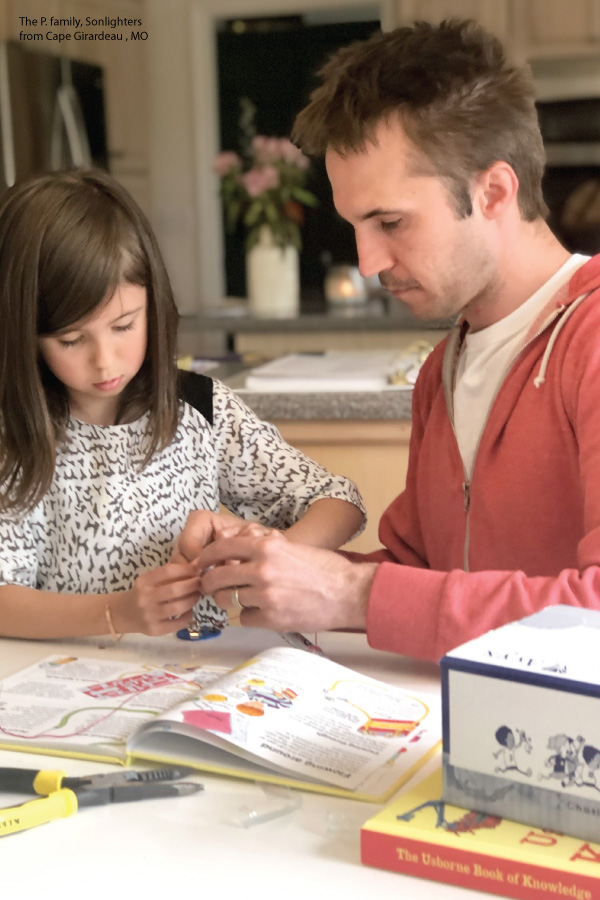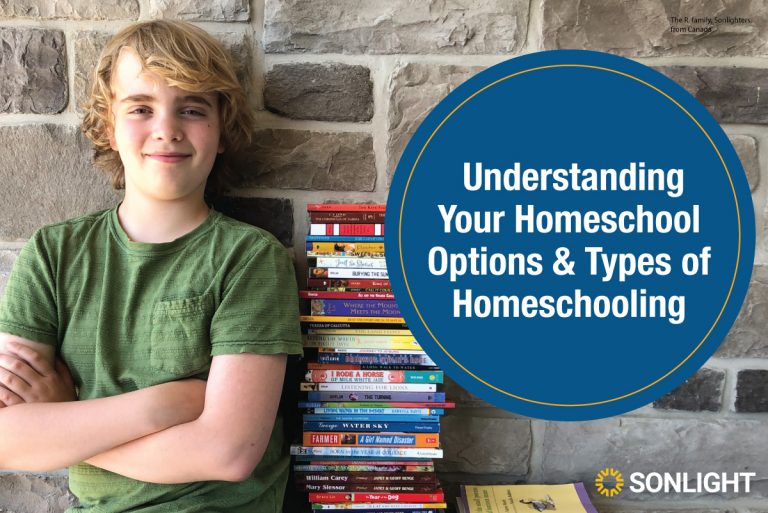When choosing to homeschool, sometimes making the choice to learn at home may seem like the biggest decision. But perhaps the bigger choices come next: what type of curriculum should you choose? There are a number of homeschool options and a growing number of homeschool philosophies out there. We’ve condensed the main homeschool options and a few key questions here to help make your journey easier.
What Are the Different Styles of Homeschooling?
Whether you’re first starting out on a homeschool journey or you’re a seasoned homeschool family, you may get asked more often than not, “What’s your homeschooling style?” Whether you can rattle off your homeschooling philosophy with ease – or that question leaves you scratching your head a bit – you likely already fit into one or more of the types of homeschooling philosophies listed below.
The Classical Approach
Classical homeschool curriculum families follow the Trivium, an age-old education style. Students are generally broken up into three age groups:
- In the grammar stage, young students focus on memorizing facts and gaining knowledge.
- In the logic stage, middle-grade students begin to understand that knowledge on a deeper level.
- In the rhetoric stage, the goal is for upper-grade students to turn that understanding into wisdom, applying it and learning to express themselves.
Classical homeschool curriculum prioritizes great books, subjects like classical history, and Socratic discussion.
Charlotte Mason
Devotees of Charlotte Mason homeschool curriculum may focus their schooling time on high-quality living books (usually narratives or stories, rather than textbooks), nature study, short lessons, dictation, and copy work. Based on the teachings of a British educator from the late 1800s and early 1900s, Charlotte Mason is known for her beliefs that children are born and must be educated as a whole person, not only a mind. She defined education as “an atmosphere, a discipline, a life.” Many Charlotte Mason families focus on spreading a feast of ideas before their children, including art and music appreciation and handicrafts.
Unit Studies
Unit studies are a homeschool option that allow you to customize curriculum based on your child’s particular interests. Do you have a child who loves geology? Legos? Minecraft? All three? Chances are you can create a unit study on the topic, or find someone who has. The benefits of unit studies are they’re customizable, flexible, and there are many available in the homeschool community. The downside is they require significant work from parents to piece together, and may leave curriculum gaps.
School at Home
Conjure an image of traditional homeschooling in your mind. You may see school refashioned at home, built on a complete homeschool curriculum package. This image might include stacks of workbooks or textbooks, pencil and paper tests, a rigid schedule, and a predefined scope and sequence for each specific grade level. Such curriculums are common and a popular homeschool method.
School at home may also be conducted through an online homeschool program, a public school district, or under the umbrella of a charter school.
Montessori
Montessori is often overlooked as a homeschooling method but many of Dr. Maria Montessori’s (an Italian educator) principles are easily adapted into homeschool life. Montessori homeschool families may focus on long blocks of uninterrupted time, carefully-selected environments that promote learning and hands-on activities. Montessori also encourages mixed-age classes, and incorporates home life as part of learning (such as using actual kitchen items to mix and pour instead of toy kitchen tools). The Montessori homeschool philosophy is particularly well-suited to children with special needs.
Montessori is popular particularly in early education. Sonlight’s new homeschool preschool program, for example, includes Montessori-type materials such as tactile letters, numbers, and shapes that help reinforce pre-writing, pre-reading, and pre-math skills.
Eclectic Homeschooling
Don’t feel like you fit into any of these categories? Or maybe more than one? Chances are your style may simply be eclectic homeschooling. Many families combine approaches from two (or more!) of these styles into their homeschool routine.
Sonlight is a great example. Ask a Sonlight family to describe their homeschool style and many times they may simply say, we use Sonlight! With classical and Charlotte Mason influences and a complete Instructor’s Guide, it’s tough to fit Sonlight into a particular homeschool philosophy. The beauty of homeschooling is choosing what works best for you and your family.
What Are the Best Homeschool Programs?
The best homeschool program, much like the best homeschool philosophy, is the one that works best for you and your family. There are not only different philosophies to consider within homeschooling, there are also many different curriculum choices for core subjects such as math, Language Arts, and history. Narrowing down a homeschool philosophy (or two) that you think may work for your children is a good place to begin.
Next, consider, do you want your children to spend much of their time learning online? If so, you may want to consider some of the best online homeschool programs. Or are living books more your style? Or, would you like to opt for a little of both? Do you have a child with special needs? One who enjoys being outside, or prefers desk learning? Also, consider your own teaching style. Do you prefer to plan things yourself, or do you enjoy having a curriculum ready for you? How will you handle student assessments or feedback? A helpful site to compare homeschool curriculum providers is Cathy Duffy Reviews, where you can search for various styles and types of curriculum.
What Is the Best Homeschooling Method?
To answer this question, it may be best to ask, what works best for your family, for your children, and for you? There are as many homeschool curriculum options as there are types of homeschool moms. You can find complete homeschool curriculum packages, piece together unit studies to suit your family’s interests, or find online programs that engage your student in virtual classroom learning. There is simply no top homeschool curriculum. What is best is what works best for your student. The beauty of learning at home is that it allows you to choose.
You can also add extras into your homeschool routine, such as co-ops that help teach certain subjects, regular field trips, or extracurricular activities that contribute to learning.
What Is Unschooling Homeschooling?
If you read through the homeschool options and didn’t see a fit for your family in the homeschool philosophies mentioned, you may consider unschooling. A shift in traditional schooling and homeschooling, this philosophy takes a child-led approach to learning, relying on students to choose their own interests and what they would like to study. Parents are responsible for providing supplies, experiences, and support the child may need to facilitate learning.
Students who might do well with unschooling are self-motivated, self-directed learners, able to be trusted to study on their own. Unschooling families don’t typically use tests, grades, or set schedules. The pro? Some call this philosophy delight-driven and say it offers students more time to pursue their passions. The downside? It may leave gaps in areas of study if students aren’t interested in focusing on a particular topic.
How Much Does It Cost to Homeschool Your Child?
Homeschool costs vary as much as families do! Whether you choose to purchase homeschool curriculum packages, track down resources from your local library, unschool your child, or enroll your child in an online homeschool program, costs can range to hundreds or even thousands of dollars per year, per child.
When choosing a homeschool curriculum, consider the value of what you are purchasing. Investing in your child’s education is an important decision. Proven curriculum providers are a reliable resource, where less expensive unit studies may leave gaps and shortchange tweens and teens.
If you are enrolling your child in an online curriculum, is there a fee per semester? Per course? Per year? Per child? If you are purchasing a textbook and workbook-based curriculum, how many copies of materials will you need per child? If you opt for a hands-on curriculum such as Montessori, materials are beautiful and high quality but can be expensive. If you choose a literary-based curriculum, consider combining students who are close in age in multiple subjects to save money (and time!). Sonlight makes it easy to teach multiple children, and have fun doing so. One initial investment pays off for multiple children as your family grows and/or as your children get older.


Can You Start Homeschooling At Any Time?
Whether it’s the middle of the school year or the middle of summer, you can start homeschooling anytime that’s best for your family. One of the greatest parts of homeschool is the flexibility it brings to the family calendar. Your school year can even go year-round. Read more about your homeschool options and how to schedule a year that works best for you.
What about homeschooling an older student who previously attended public or private school? It’s never too late to start homeschooling if you feel it’s best for your family. There are plenty of people who would choose to learn at home if they could relive their middle school years, and there are some very compelling reasons as a parent why teaching your high schooler at home might be the best option. Taking these years to spend time with your older children, set the bar higher, tailor learning to their interests, and give them a taste of real-life before they graduate are just a few.
Do Parents Get Paid for Homeschooling?
Although most homeschool parents will tell you it is at least a part- if not a full-time job, homeschooling your own children is unpaid. A handful of states may allow parents to apply for tax benefits or stipends if educating their child under the umbrella of a charter school (which comes with its own set of requirements), but these are rare.
What is possible is getting paid while homeschooling, by working part-time from home, freelancing, or even homeschooling or tutoring a student from outside your family, if your state allows it.
How Can I Start Homeschooling Immediately?
You can start homeschooling today! Before you begin, check your state’s homeschooling regulations and how to comply. Find other homeschool parents to connect with, who can offer words of advice as you start this exciting chapter. Sonlight has a Sonlight Connections app for homeschooling parents, where you can talk with a Sonlight mentor or advisor.
Still not sure which homeschool philosophy is right for your family? Sonlight makes it easy to get started today. Check out a sample Sonlight Instructor’s Guide. Take a visit to the local library and enjoy picking out a feast of living books. Don’t be afraid to learn more about the homeschool options on this list. Then give yourself some grace as you learn what works best and create a homeschool you love.










